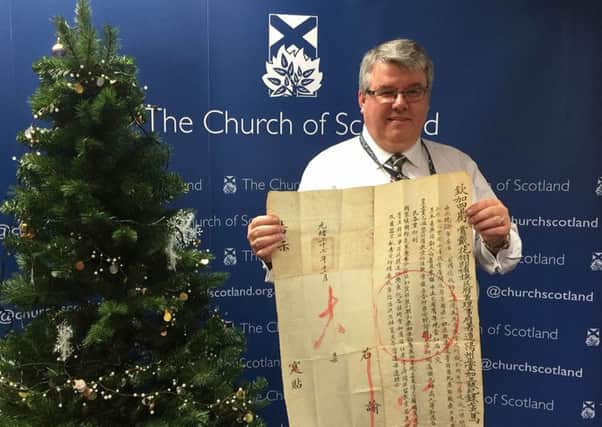Scottish Presbyterians unearth '˜priceless' Chinese document


The striking document – about two feet long and written in calligraphy – was issued by the Court of Emperor Kuang Hsu after the Boxer Rebellion ended in 1901.
Described by the Church of Scotland as a priceless document with “considerable historic significance”, it appeals for peace between religious believers and civilians, authorises the resumption of Christian evangelism and states that all churches in the north-east of the country should be reopened.
Advertisement
Hide AdAdvertisement
Hide AdThe proclamation, which is as delicate as tissue paper, warns “ignorant gangsters” that they would be arrested, tried and “severely punished without mercy” if they failed to return occupied properties to Christians.
The document, which effectively ordered the government of north east city Liaoyang to protect Christian activities, was uncovered in an archive at the church’s central offices in Edinburgh last month.
More than 300 Protestants and thousands of Chinese Christians were killed by a secret organisation called the Society of the Righteous and Harmonious Fists, who were opposed to the spread of Western and Japanese influence, during the 1899-1901 rebellion.
Protestant missions to China had begun in earnest following the Opium Wars of the 19th century, which forced the nation to open to western trade.
Advertisement
Hide AdAdvertisement
Hide AdThe rebels – known as Boxers because they performed exercises they believed would help them withstand bullets – killed western and Chinese Christians and destroyed foreign property during their anti-foreign uprising. The forms of death meted out to Christians were brutal.
The peasant uprising ended when an international force of around 20,000 troops from eight nations, including the UK, overwhelmed the rebels.
Sandy Sneddon, Asia secretary of the Church of Scotland’s World Mission Council, said: “When the document from the Court of Emperor Kuang Hsu came to light we immediately knew it was something special.
“The beautiful calligraphy is striking and when we had it translated we realised this was of considerable historic significance. “Our partners in China explained that the proclamation showed the respectful relationship the Scottish missionaries had built up with the Chinese authorities.”